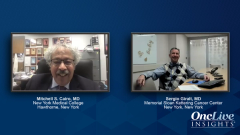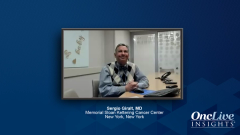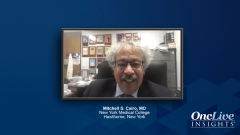
Challenges in Diagnosing VOD
Mitchell Cairo, MD, and Sergio Giralt, MD, provide insights about the challenges in diagnosing VOD and the need to educate physicians about risk factors for VOD, its pathophysiology, and the importance of early detection.
This is a synopsis of an Insights series featuring Mitchell S. Cairo, MD, of New York Medical College, and Sergio Giralt, MD, of Memorial Sloan Kettering Cancer Center.
Dr. Giralt noted colleagues at smaller transplant centers feel radiologists are uncomfortable diagnosing VOD or reversed portal venous flow, posing a major challenge. He asked Dr. Cairo what other challenges clinicians face.
Dr. Cairo responded the first is overcoming naysayers who still do not believe VOD occurs post-transplant, despite 80-90% historical mortality without treatment. Second is understanding VOD pathophysiology including prothrombotic sinusoidal endothelial damage, capillary leakage, and subsequent clinical findings like hepatomegaly, pain, fluid retention, ascites, jaundice, and portal hypertension. This facilitates early VOD diagnosis. Finally, some delay diagnosis for days, though early recognition is key to enable effective therapy.
Dr. Giralt agreed, asking about radiology expertise. Dr. Cairo responded the needed Doppler ultrasound skills are basic and objective for hepatology and transplant, with quantitative criteria like velocity and flow direction, though interobserver variability exists. Specialized radiologists may overcall benign abnormalities. The learning curve is short for motivated clinicians. Dr. Giralt advised being present to guide radiologists on needed images and flow measurements. Dr. Cairo stressed any practitioner caring for transplant patients should learn to perform and interpret Doppler assessments for VOD. Though false positives occur, benefits outweigh harms. Dr. Giralt advocated direct communication between treating clinician and radiologist to clarify findings and facilitate learning on both sides.
*Video synopsis is AI-generated and reviewed by OncLive editorial staff.










































